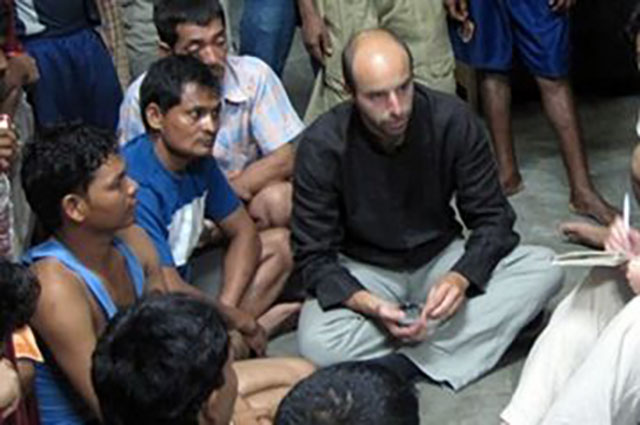Bangladesh is a major country of origin of migrant workers. With workers specifically skilled in the garment industry, many Bangladeshi women migrate for work in textile and garment manufacturing in Mauritius or Jordan. Whereas migrant workers in general represent a contribution of 13% of the Bangladeshi GDP in remittances, they largely remain unprotected and often face serious exploitation and abuse throughout their entire migration experience.
Little is being done to protect or prevent them from being deceived throughout the process of recruitment or exploited when employed at the final destination. Most are unduly, unfairly and exorbitantly charged for recruitment, transportation and essential needs such as food and accommodation.
It is the international legal obligation of countries of destination, origin and transit to protect the human rights of migrants on their territory and business too, as employers and recruiters have the obligation to respect human rights. In the first instance urgent action is needed from both to better protect what today is Bangladesh’s main economic and human asset, migrant workers and their families.
At a grassroots level, civil society organisations have a particular and complementary role to play in advocacy as well as protection, rehabilitation and reintegration of migrant workers. However, in their work with migrant workers abroad, migrant rights’ organisations are faced with practical barriers to effectively protect migrant workers in countries of destination.
Specific challenges are access and leverage points in destination countries as well as a lack of expertise and specialised knowledge on local labour rights, wages and working conditions as well as more general obstacles related to language and complex public administration.
At the same time, trade unions face challenges to organise migrant workers, not in the least due to legal restrictions and government interference with freedom of association and the right to organise, but also due to insufficient links or experience with and insight into the needs of specific migrant communities. Consequently, some trade unions seem to struggle to identify good access points to reach out to migrant workers. Traditional union organising techniques at company level have often proved ineffective to organise and protect migrant workers. New and targeted strategies to reach out to the migrant workforce are therefore needed.
Trade unions have strong international history and culture, which has resulted in long standing and strong regional and global networks. The global umbrella organisation for trade unions, the International Trade Union Confederation (ITUC) has started coordinating and developing transnational partnerships between trade unions in origin and destination countries to try to overcome some of the practical obstacles preventing them from supporting migrant workers.
These partnerships usually include exchanges of information on labour rights and pre-departure information sessions for migrants as well as support and legal assistance in the country of destination. Experience in practice with these partnerships confirms this specific challenge to reach out to migrant workers both in destination and in origin countries. In some countries, however, trade unions have successfully organised migrants by working together with migrant rights and diaspora organisations. Cooperation in other countries has resulted in migrant workers’ service centres where trade unions answer to labour related questions and migrant workers associations to migration related queries. Others have developed joint campaigning strategies and in some cases migrants’ organisations have even transformed, built up democratic structures and registered as official trade unions.
Many migrant workers, especially the most vulnerable, leave rural and poverty stricken homes with few decent work opportunities forcing them to migrate out of necessity rather than choice. Trade unions are often most present in traditional industrial sectors and in cities rather than these rural areas. Community based organisations such as migrants’ rights, faith-based and diaspora organisations sometimes have direct access to migrant communities and could increase the trade unions’ capacity to reach out to the most vulnerable groups. Trade unions’ strong international networks, bilateral partnerships, expertise in labour market and labour rights related issues, and experience with settling labour disputes offer considerable benefits for migrant organisations in terms of protection of their membership or beneficiaries.
Mutually beneficial alliances and cooperation agreements could thus be developed between different civil society organisations, fully respecting their respective identity and mandate, but complementing each other in reaching the mutual goal of better protection of migrant workers. Terms and conditions obviously remain to be explored on national or local level answering to the needs, opportunities and capacities of organisations and migrant workers involved. Bangladesh’s migrant labour force now remains largely outside the protection networks of migrant rights organisations and labour unions. Both, though, should consider the potential to organise the collective voice of these workers by addressing their needs and defending their rights and interests, thus strengthening the democratic base of civil society in Bangladesh.
We urgently need to start exploring the development of migrant worker alliances involving trade unions and migrant rights’ groups in Bangladesh.





























How should businesses respond to an age of conflict and uncertainty?
As 2024 began, European Commission President Ursula von der Leyen aptly summed up our deeply worrying collective moment. As she put it, speaking at the annual World Economic Forum in Switzerland, we are moving through “an era of conflict and...
26 March 2024 | Commentary
Commentary by Scott Jerbi, Senior Advisor, Policy & Outreach, IHRB